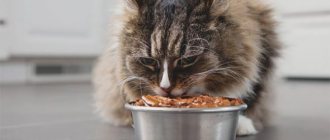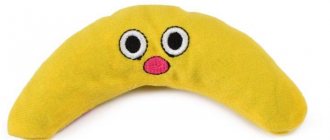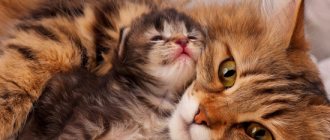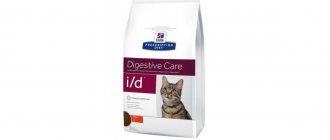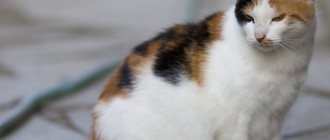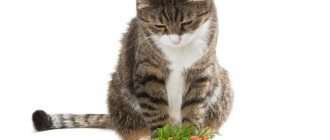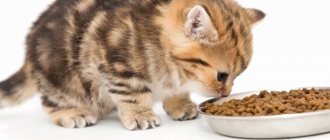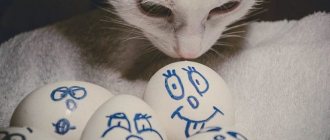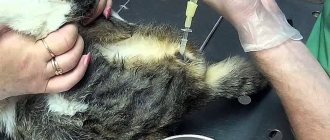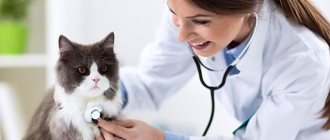An important task for owners of a cat who has recently given birth is to provide their pet with the right food. The food determines how quickly the young mother will recover and how nutritious and harmless her milk will be for the kittens. There are important rules about how and when to feed an animal. There are special ready-made foods, as well as tips for preparing meals yourself, suitable for cats who have recently given birth.
- 2 How long after giving birth should you feed a cat
2.1 Is it safe for a cat to eat afterbirth? - 2.2 List of the most useful products for a cat who has given birth
- 2.3 Prohibited Products
- 2.4 When can you give your cat dry food that she ate before giving birth?
Features of cat nutrition in the first days after birth
A newborn cat needs balanced and nutritious food without artificial chemical additives. The diet is selected individually and depends on the animal’s well-being. The nature of the recovery period directly depends on how exactly the birth went: whether it was natural and timely or there was a delay, a caesarean section was used, etc. If there are complications, the animal’s diet should be prepared by a doctor. During an easy birth, owners can figure out the nutritional schedule and list of suitable foods themselves, following simple rules:
- The cat should receive with food a large amount of easily digestible carbohydrates (at least 40% of the total nutritional value of food) and protein (at least 34%).
- After giving birth, the animal needs a lot of fluid, as it affects the amount of milk produced.
- Fatty foods and excess salt are prohibited. Spicy food should not be fed to any animal, either before or after birth.
- Feeding should be fractional - it is better to give food in small portions 4-5 times a day.
Food should be rich in calcium, magnesium, phosphorus, potassium, zinc, selenium, manganese, iron. The most useful vitamins for a cat and her kittens recovering from childbirth are A, D3, B1, B2, B5, C. Mom and her babies also need folic acid, taurine, beta-carotene, arginine and L-carnitine.
A cat that has given birth and is nursing should definitely refrain from hunting. If an animal goes outside, then collars with a bell will protect you from accidentally eating mice and birds.
Pros and cons of eating afterbirth
Each kitten develops in an individual “pouch” - the placenta, which is expelled after the kitten. Instinctively, the cat breaks the bladder, stimulates the opening of the lungs, gnaws the umbilical cord and eats the afterbirth. The tissues of the placenta contain a lot of moisture, protein, vitamins and stimulants.
Many breeders are against eating afterbirth, arguing that it may cause indigestion. This reasoning is very sound when it comes to “problem” or “man-made” breeds, such as Scottish Fold cats. Stronger, and especially “noble” cats should not be restricted.
Wild cats give birth to 2–4 cubs, but domestic pets have long forgotten these norms. It happens that the owner comes home, and his pet is lying on his favorite sweater and licking 7-8 kittens, all the afterbirths have been eaten. For prevention purposes, you need to give your pet unsweetened enterosgel and boiled lean rice as a natural absorbent.
How long after giving birth should you feed your cat?
Usually, during the first 24 hours, even after a successful birth, the cat refuses food. She shouldn't be forced. The only thing she needs immediately after the babies are born is a warm drink. Starting from the second day, you need to feed the animal charmingly, since the quality and quantity of milk depends on food (and kittens suckle the cat often - every 2 hours).
Organize fractional meals at regular intervals (4–5 times a day, but with portions 3 times smaller than usual)
For the first week, the feeding of a nursing female should consist only of easily digestible, nutritious and natural foods - these can be low-fat milk and fermented milk products, vegetables, and cereals. You should abstain from meat for now, but if the cat really asks, then you can give a little low-fat meat broth. From day 7, “usual” foods are gradually introduced into the diet, including boiled meat and fish. If there were no complications during the postpartum period, by the third week the cat will recover and go back to its usual food.
Is it safe for a cat to eat afterbirth?
In the womb, kittens “live” in a special sac called the placenta or afterbirth. During childbirth, this sac comes out with the baby, and the cat often eats the membrane. There is nothing dangerous about this. The animal does this intuitively for reasons of safety (in the wild, animals thus destroy the smell of blood that attracts predators), as well as in order to provide itself with vitamins and nutrients, which the afterbirth is rich in.
However, there is an opinion that for a domestic cat to eat all the afterbirth means to incur stomach problems. Therefore, it is not recommended to allow a young mother to eat more than 1-2 afterbirths.
List of the most useful foods for a cat who has given birth
In the first weeks after the birth of kittens, a cat who has given birth experiences a deficiency of vitamins and minerals, since most of them “go” into the milk. Constant lactation leads to greater consumption of water and proteins. The owners' task is to provide the animal with food that will fill the gap in these substances. The basis of the diet should be:
- low-fat meat broth;
- fermented milk products;
- boiled meat, thoroughly chopped and slightly softened with broth.
The presence of coarse fibers and fiber in a cat’s diet plays an important role in restoring the functioning of the digestive system. They are present in cereals and vegetables. Some cats happily eat grass and fruits (for example, watermelons, melons) - after giving birth, it is better to refrain from such treats, as they can provoke an allergic reaction in kittens.
Prohibited Products
Cats should not be given raw meat. It is difficult for digestion (and after childbirth, the digestive tract works in a slower mode, so the risk of constipation is high). It is necessary to exclude large amounts of salt from getting into the milk (as it impairs the absorption of calcium and leads to a slowdown in the development of the kittens’ skeletal system) - you should not treat the mother who has given birth to cheese, sausages, sausages and other salty foods.
If you notice that certain foods cause diarrhea, you should stop giving them to your cat. After childbirth, the female’s body is already dehydrated, and diarrhea will lead to even greater loss of water, which is fraught with complications.
When can you give your cat dry food that she ate before giving birth?
The biscuits that the cat ate before pregnancy can be given to the animal again only after lactation has stopped. This usually occurs 4–7 weeks after birth. In the first week of returning to dry food, it should be slightly moistened with broth, since there is a possibility that the cat’s body has not yet fully restored the functioning of the digestive tract. It’s a different matter with food that was originally intended for giving birth and lactating animals. They can be given to the female 1–2 weeks after giving birth. without waiting for the end of lactation.
Royal Canin QUEEN PRO is a premium food that can be given to a cat after giving birth
Results
Cheap food with dyes and flavors will certainly “reflect” on the appearance of your pet. For example, the Maine Coon breed does not have any special taste preferences, and is not classified as picky.
If you give a nursing cat an economy class, goodbye to fluffy fur and shine, even to the loss of whiskers and weight loss of kittens.
Proper cat nutrition will definitely make itself felt - the kittens are not thin or restless, the nurse’s coat is not dull, and her body weight has not changed much. The ideal option is when a cat that has fattened its offspring shows on the scale its previous weight before pregnancy.
Ready-made food suitable for postpartum cats
| Name | Form | Compound | Peculiarities | approximate price |
| Royal Canin Queen 34 PRO | Dry |
| Can be used throughout pregnancy and until the end of lactation. |
|
| ProPlan Junior |
| Suitable for kittens, pregnant and lactating cats. After birth, food can be given from the second week (soaked in water or broth). |
| |
| Royal Canin Mother & Baby cat | Dry food, canned food | Dry:
Canned food:
| Can be given to cats in a soaked form from the second week after birth, suitable for starting complementary feeding for kittens. |
|
| BOZITA Funktion Kitten | Dry |
| Suitable for kittens, pregnant and lactating cats (from the second week after birth). |
|
| Eukanuba Kitten Healthy Start |
| Primarily intended for kittens, but suitable for feeding cats from the third week after birth. |
|
Royal Canin Mother & Babycat canned food is suitable for both kittens and cats from the second week after birth
Reviews of food for nursing cats
Bozita did not suit us. The mother in labor willingly ate it, but the kittens began to have severe diarrhea from this food.
dellaros
https://foren.germany.ru/arch/animals/f/26404016.html
I fed my cat Royal Canin Queen 34 food at the end of pregnancy and throughout the entire period of feeding the kittens. The kittens' father also lived with us and also ate these crackers. They ate the food without any problems - there was no need to persuade. In two months, the cats became noticeably prettier, growing a belly, cheeks and a luxurious fur coat.
Selenia_6
https://irecommend.ru/content/kot-vyros-kak-na-drozhzhakh-koshka-mama-pokhudela
I adopted a cat from the street, and she turned out to be pregnant (and gave birth to kittens a week and a half ago). The veterinarian advised feeding her Pro Plan Junior food. Packs of 400 grams were enough for my new pet for a maximum of a week. The food is presented in the form of flattened small balls. The cat liked the taste immediately - she just pounced on the food. I couldn’t pour it into a bowl on the floor, I always had to take it in one hand and pour the food with the other, because otherwise the cat’s head would end up in the bag. The stool of both cats and her kittens is always in order, the fur has become much smoother, everything is fine with health.
Polina_Krukovskaya
https://irecommend.ru/content/khoroshii-korm-po-krainei-mere-menya-poka-ustraivaet
Psychological comfort
In order for the pet to feel safe, the mother and kittens should be kept in a quiet room where family members (except for the one watching the litter and the pet) should not enter unless necessary. Children and guests should not be allowed to touch the kittens, as a worried cat may believe that her babies are in danger. In such situations, the cat’s behavior can be unpredictable: the milk will disappear, or the pet will drag the kittens to a secluded place and hiss at everyone who wants to approach. Sometimes particularly nervous cats even destroy the offspring, believing that it is impossible to raise it under these conditions.
What products help solve the problem of insufficient lactation in cats?
If your cat produces very little milk, you can stimulate production by adjusting the diet. Start giving your animal more fluids (problems with lactation often occur due to dehydration).
A bowl of water or milk should be kept near the nest, as sometimes the female would rather be thirsty than leave her babies
Try to give your cat more fermented milk products - low-fat kefir, sour cream, yogurt without additives. Carrots and boiled pumpkin are useful, which can be given to the animal along with meat broth. Walnuts have a milk-containing effect - just grind 2-3 kernels in a blender to a powder and add them to warm milk. If the cat refuses to drink this medicine, you can pour it into her mouth using a syringe without a needle. Lactation is also stimulated by quail egg shells and oat sprouts. As with nuts, they must first be crushed and then mixed with milk.
Proper nutrition after birth will allow the cat to quickly recover (gain weight, return to its former activity). It is also important to monitor the diet because the quantity and quality of milk secreted by the female depends on food. On the first day, you should feed your cat broths and fermented milk products, then you can add a little meat or switch to special ready-made food intended for lactating animals.
A very dangerous symptom!
Refusal of water and an increase in body temperature are a sign of eclampsia, accompanied by a sharp jump in blood pressure. The cause of acute neurological disease is a low level of calcium in the body.
Risk factors: first, especially multiple births; frequent pregnancy in females predisposed to the disease.
Urgent medical attention is required even with mild signs, which are sometimes perceived as... the whims of a cat. For example, first - restless, and then inappropriate behavior. More serious consequences include attacks with paralysis of the back of the body, convulsions, etc.
Treatment not started on time can lead to the loss of your pet. It is best to find out about the state of her health long before mating, treat her, also worm her and vaccinate her.
